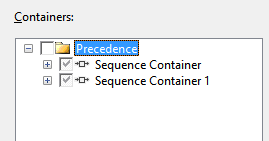介绍
本文中,我们将结合之前学习的时间冒泡,日志记录,以及复制模型.建立一个自定义的SSIS包日志模型.
SSIS Task事件回顾 Reviewing SSIS Task Events
在做实验之前我们更改一下 Precedence.dtsx SSIS 包的设置. 把 Precedence.dtsx SSIS 包的 DisableEventHandlers 属性改为True
Figure 2
屏蔽内置日志 Disable Built-In Logging
首先我们要移除已经存在的日志配置.点击SSIS 下拉菜单然后点击 Logging :
Configure SSIS Logs 显示以后点击Delete 按钮删掉之前的文本日志配置 .
从技术上来说,刚才的步骤做了以后.日志就不会记录了. 不过我有洁癖,所以把Containers这边的复选框也取消选择了
Figure 9
同样的可以把 file connection manager 也删掉
我们把Level 11配置的东西都删掉. 执行一下包,没问题就继续下面操作.
事件冒泡回顾 Event Bubbling, a Review
这里省略不翻译了,有需要的朋友可以看之前的章节
[译]Stairway to Integration Services Level 10 - 高级事件活动
父子模型日志记录的准备 Preparing for Parent-Child SSIS Design Pattern Logging
首先我们需要一个数据库和表来记录日志. 先创建一个名为 “SSISStairwayConfig”数据库. 代码如下:
Use master go /* SSISStairwayConfig database */ If Not Exists(Select name From sys.databases Where name = 'SSISStairwayConfig') begin print 'Creating SSISStairwayConfig database' Create Database SSISStairwayConfig print 'SSISStairwayConfig database created' end Else print 'SSISStairwayConfig database already exists.' print '' go
Listing 1
接着创建 “lg” schema 和“SSISErrors” 表:
Use SSISStairwayConfig go /* log schema */ If Not Exists(Select name From sys.schemas Where name = 'lg') begin print 'Creating lg schema' declare @sql varchar(100) = 'Create Schema lg' exec(@sql) print 'Lg schema created' end Else print 'Lg schema already exists.' print '' /* lg.SSISErrors table */ If Not Exists(Select s.name + '.' + t.name From sys.tables t Join sys.schemas s On s.schema_id = t.schema_id Where s.name = 'lg' And t.name = 'SSISErrors') begin print 'Creating lg.SSISErrors table' Create Table lg.SSISErrors ( ID int identity(1,1) Constraint PK_SSISErrors Primary Key Clustered ,ErrorDateTime datetime Not Null Constraint DF_logSSISErrors_ErrorDateTime Default(GetDate()) ,ErrorDescription varchar(max) Null ,ErrorCode int Null ,SourceName varchar(255) Null ) print 'Lg.SSISErrors created' end Else print 'Lg.SSISErrors table already exists.' print ''
Listing 2
记录父子SSIS设计日志 Applying the Parent-Child SSIS Design Pattern to Logging
打开Parent.dtsx SSIS 包,然后定位到 OnError 事件处理:
脱一个 Execute SQL Task到 OnError 事件处理界面然后与 Script Task 连起来:
Figure 19
打开 Execute SQL Task Editor 然后把 ConnectionType 属性改为 ADO.NET :
点开 Connection 属性下拉框,点击 “<New connection…>” :
点了以后会生成一个新的 ADO.NET Connection Manager 在Connection Managers 标签下面可以看到 :
Configure ADO.NET Connection Manager 编辑框:
点击New按钮配置一个新的数据连接. 选择我们刚才创建好的数据库
Figure 26
点几 OK 按钮关闭 Connection Manager 编辑器,返回Configure ADO.NET Connection Manager 显示如下:
数据连接会记录在你的配置文件里面. 以后部署好SSIS包依旧可以使用.
在 SQLStatement 属性里面输入以下代码 :
Insert Into lg.SSISErrors (ErrorCode ,ErrorDescription ,SourceName) Values (@ErrorCode ,@ErrorDescription ,@SourceName)
Listing 3
这个我们创建的插入语句包含了三个参数 : ErrorCode, ErrorDescription, and SourceName. 点击parameter mapping 也来映射变量,点击Add按钮,配置如下图:
Figure 30
System::ErrorCode SSIS 变量的类型为 Int32 (integer) 与插入语句中的 @ErrorCode 参数映射.
Direction 包含 Input, Output, 和 Return 值. Data Type 字段包含 ADO.Net 的数据类型 . (这个根据我们之前设置 Connection Type的不同而不同)
用ADO.Net 而 OLEDB 连接类型是有原因的: 在SQL语句和ADO.Net里面我都可以使用参数名. 而用 OLEDB 的话我不得不在SQL语句里面打上问号 . 而引用参数的时候还得打上编号( 0是第一个问号,1是第二个问号…. ) 我觉得 ADO.Net 语法更清楚.
再把另外两个参数也映射一下.
Figure 32
执行 Parent.dtsx SSIS 包 :
Figure 33
验证一下数据库中是否记录了错误 日志
Use SSISStairwayConfig go Select * From lg.SSISErrors
Listing 4
结果如下 :
Figure 34
原文链接:
http://www.sqlservercentral.com/articles/Integration+Services+(SSIS)/96657/
项目文件:

















